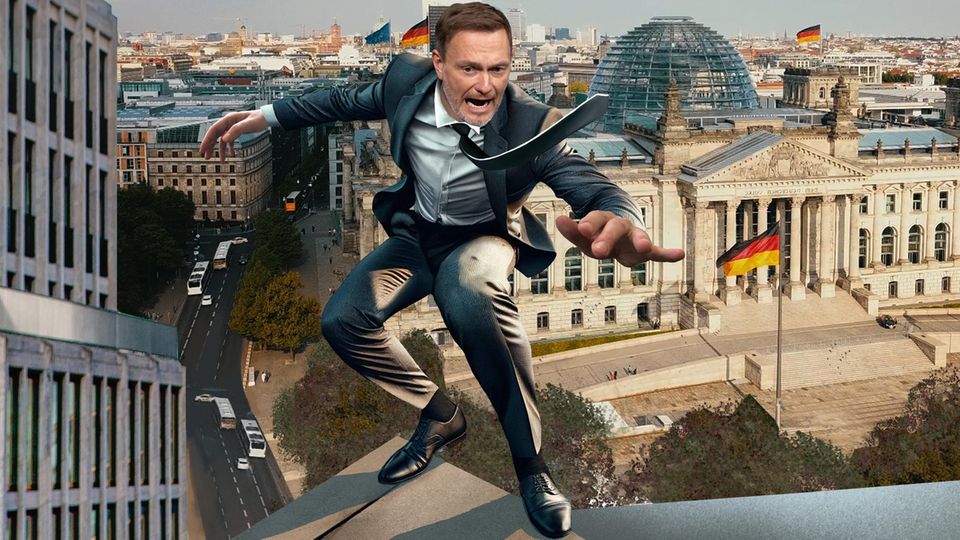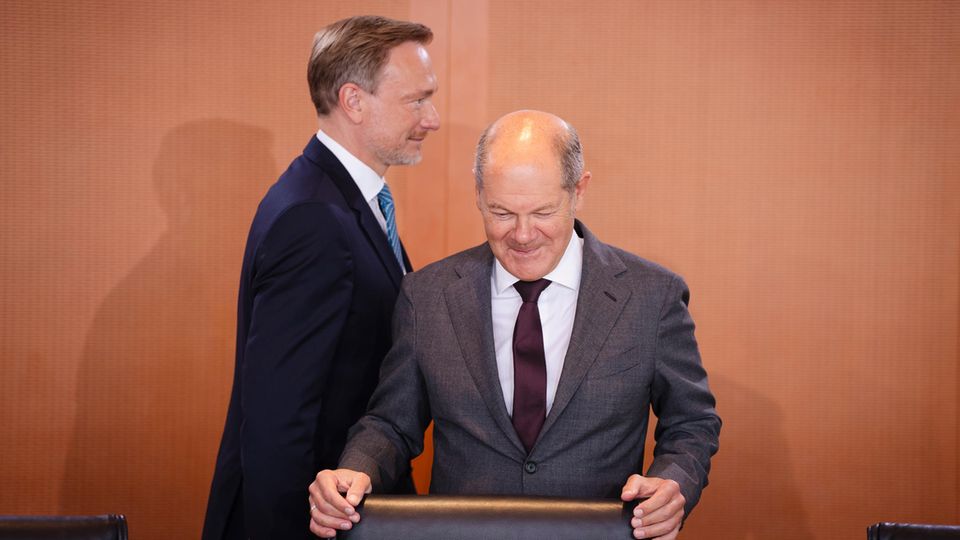Rhetorically very good, content nebulous. Christian Lindner used the talk with Caren Miosga exclusively for his self-portrayal.
Andea Zschocher
“We hope for the budget negotiations.” With this sentence, Caren Miosga ends her Sunday talk, which was actually supposed to bring clarity to so many questions about the coalition and the FDP. So after an hour, as is often the case after such a talk show, we are left with the disappointing realization: these rounds don’t really make you any smarter, but they did offer selected politicians a platform to raise their profile. In this case, you can at least say that you have now learned more about Christian Lindner’s hobby, hunting. The titular question of the evening: “Does the traffic light break because of money, Mr. Lindner?” was circled in the second half of the talk, but ultimately remained, as expected, unanswered. And that wasn’t because the guests weren’t argumentative and aggressive, but above all because the Federal Minister of Finance knows how to defend himself rhetorically in such a way that he only elicits the answers that serve him most.
Guests at “Caren Miosga” were:
• Christian Lindner, Federal Minister of Finance (FDP)
• Kristina Dunz, deputy head of the capital office of the Editorial Network Germany
• Jens Südekum, Professor of Economics at the Heinrich Heine University Düsseldorf (SPD)
Christian Lindner on the hunt
Of course, this tactic of political talk is not only a profitable tool for Christian Lindner. His supporters will consider the talk show appearance a success. Lindner was able to present himself throughout the evening in a way that would suit a federal politician. Approachable and human when it came to his hobby, hunting. “I like being out in nature,” he said, adding that this experience had “something meditative” about it, unlike his everyday life as a politician. For Lindner, hunting is a “completely natural form of food production” in which he is overcome by a “feeling of regret” when he stands in front of the animal he has shot.
Homestory about the Finance Minister
There was a lot of human interaction in the first few minutes of the show; Lindner stated that criticism of himself that was “unobjective” or “personal” would annoy him. When he then philosophized about how he was blessed with love and friendship and affection in his life and therefore knew how to deal very well not only with criticism but also with the challenges in his job, the home story about the finance minister was in sack and bags.
Anecdotes vs. facts
Caren Miosga slowly approached the important questions, because even if it might be interesting for tabloid magazines and readers to see how Christian Lindner spends his free time, the political talk on Sunday evening has other plans. And the finance minister has his own. This field of tension in the productions was certainly interesting to watch, but the gain in knowledge was very limited. Because whenever Miosga confronted Lindner with direct incidents from the coalition, he evaded it.
In response to the accusation that the FDP was the opposition in his own government, Linder talked about a letter that a furniture manufacturer had sent to him in the run-up to Christmas. Anecdote against facts, Lindner is certainly not the first politician to rely on this type of distraction. It also works, in a time-limited interview not every point can be repeated over and over again.
As the program continued, journalist Kristina Dunz tried to address this point again. Lindner switched to the topic of child poverty. An important, urgent issue on which the Finance Minister could have made points. There is a consensus that the situation here urgently needs to improve. “Child poverty has something to do with migration,” explained the FDP politician. You have to “take that as a fact”. Lindner simply ignored the fact that the topic can never just be a migration issue. It is well known that financial poverty also affects German children. Unfortunately, no one present intervened at this point. Lindner went on to explain that the majority of Germans would certainly not support it if they only gave more money.
Make you want to work overtime
Work must become more worthwhile again, another big topic for the finance minister. You have to “make people want to work overtime,” he said. Work is more than just making money; it is meaningful when the general conditions improve. This is currently not always the case, which is why, according to Lindner, too many people are receiving citizen’s benefit. But this is only intended for precarious situations. The demands on the welfare state are too high.
The current budget is also precarious. The FDP continues to stick to the debt brake, the economist Jens Südekum tried several times to direct the conversation to the fact that, given the current domestic and foreign policy challenges, austerity measures are not promising. In his opinion, a reform of the debt brake is necessary. Christian Lindner rejected this. “Today’s debts are tomorrow’s tax increases,” he said, pointing out twice that the economist is a member of the SPD. At the beginning of the year, the party discussed reforming the debt brake, and Südekum is on the party line here.
Further topics:
– Support for the Thuringian election campaign? Thomas Kemmerich will not receive any support from the FDP for his election campaign. “This regional association is going its own way,” said Lindner.
– Household distribution: There is “a lot of money,” said Christian Lindner when asked about possible budget cuts. He just wanted to distribute it better.
– Communication problems in the coalition: “I admit my complicity,” said Lindner when asked by Dunz why the three parties cannot communicate better and more effectively with each other. But there is no improvement in sight here.
Both Caren Miosga and Kristina Dunz asked the Finance Minister directly whether he would like to continue the coalition until the next federal elections in 2025. Christian Lindner did not give a concrete answer. He doesn’t want to expose himself to “blackmail” with a definitive statement. “There is no blank check” for the coalition to remain in place. Dunz called this approach “igniting”; Miosga had already drawn the parallel to the Lambsdorff paper in 1982. At the time, it was a leap into an “intra-party conflict situation” that was not easy to play with, said Lindner. However, the FDP politician did not want to make a clear commitment to the existence of the coalition until 2025. Perhaps a joint hunting trip with the coalition partners could calm tempers and, by the way, ensure better communication?



